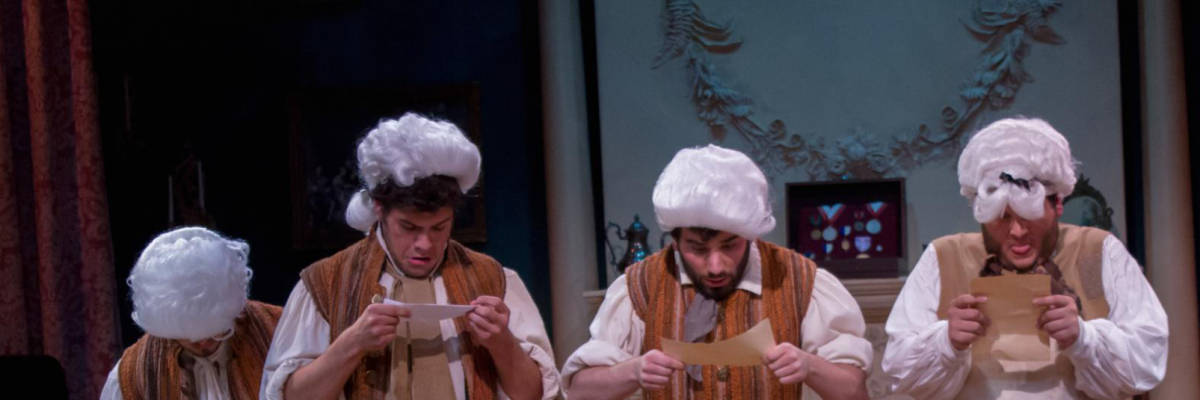- APPLY NOW
- Admissions
- Film and Media Arts
More in Film and Media Arts:
- Theater
- Events
- Giving
More in Giving:
- About
More in About:
MFA Alum Molly Sorensen's Film Mud and Honey Selected for IFP/Gotham Student Short Showcase

MFA Alum Molly Sorensen's Film Mud and Honey Selected for IFP/Gotham Student Short Showcase
Feb
3
2021
MFA alum Molly Sorensen's thesis film, Mud and Honey, has been selected as one of the five winners of IFP/Gotham's Student Short Film Showcase. Winners will screen their films on JetBlue flights and on Focus Features digital platforms through respective partnerships with IFP/Gotham.
To celebrate this wonderful achievement, we caught up with Molly Sorensen. Read on to learn more about the process of making Mud and Honey and what Molly's up to now!
Tell us a little bit about your short film Mud and Honey. What was the inspiration for this film? You mention the film touches on the theme of self-worth -- can you elaborate?
Mud and Honey is the culmination of a lot of teenage angst. Those seemingly endless summers spent dreaming of what life is like outside the town limits. I really wanted to focus on how formative those years are and how achingly slow they can feel.
I feel like it’s easy when you’re young to let your identity and self-worth get caught up in other people. And for Maeve and Delilah, they are both desperately looking for something from each other that they aren’t getting other places. It became a lot about who we spend time with when we’re at our lowest, and how painful it can be if you let too much ride on someone else’s actions. A sort of ‘she loves me, she loves me not’, ‘how close is too close’ kind of thing. It also deals with both of them digging their sexual identities out from under years of suppression, and the side effects that come along with that. At some point it all boils over, and a lot of the story was inspired by those dark days and the strange longing to feel that intensely again.
What was the process of making this film like for you? Are there any particular lessons you'd like to share with other student filmmakers?
Making Mud and Honey was definitely a learning process. It can be hard to open up when something means a lot to you, but collaboration is so valuable and critical in filmmaking. I was very lucky because a lot of incredible people took stock in this film, and I’m eternally grateful for them believing it was worthwhile. I guess the lesson there is to try and get out of your head and accept the help.
I did a lot with poetry when I first started at Temple, and so I was big on sensory writing and really gravitated toward nostalgia and little details. Although it helped in the development stages, my takeaway is to be careful not to get blinders on. I wish I focused more on structure and the more logistical side of things out of the gate. But nostalgia tends to be more fun.
How did your time at Temple inform your current trajectory as a filmmaker? Any favorite memories or especially important classes?
Two classes that come to mind are our Thesis Workshop with Lauren Wolkstein and Scene Analysis with Jeff Rush. Eran Preis was always enthusiastic and supportive, as well as so many others. They all really drove home the lessons of “writing what is closest to the surface” and that “nothing in the script is too precious”. Not to mention Madeleine Bishop and Lindsay Vitale read the script as Maeve and Delilah so many times, the painful first drafts are probably still burned into their brains. In all seriousness, it’s so important to fully appreciate that support system while you have it and to lean into the process.
As far as my trajectory, the Temple community definitely opened my eyes to the inequity that exists when it comes to representation. When it comes to the LGBTQIA+ community, a lot of visibility is limiting and often over-sexualized. I’m still learning a ton about the representation of marginalized communities and where my voice as a filmmaker and an individual fits. This kind of circles back to how important character and world-building are in the writing process, and I plan to take those lessons with me into future projects.
How has the process of entering this film into festivals been? Is there something others should know about that process?
The festival process has had its ups and downs. It took a while to gain some traction, but we’ve had a lot of good feedback. I would say it’s very important to keep up with the connections you meet through festivals. It could lead to invitations to show your film other places or even future collaborations. And enter early! It gets expensive, and it can definitely pay off to reach out and ask if there are waivers or discounts. Some good advice that was given to me: look for the niche festivals, little corners where your film could fit, and take advantage of those.
What is next for you?
I’m doing a lot of writing these days, and revisiting an older story that fell by the wayside. I’m hoping to attend a story lab this year to try and get my next project underway.
Anything else to add?
I’ve really learned that creativity is so cyclical, and to try and be forgiving with yourself. Imposter syndrome can creep in really easily, because being consistently creative requires a tough upkeep (something I’m not the best at). As silly as it sounds, keep going. And I just want to say thank you to everyone who helped in this process for the kindness and support.




